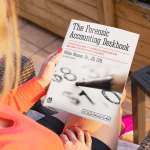Judging Forensic Accountants on Likeability, Gravitas, Gender & Age
What Mason thinks lawyers tell clients when choosing among forensic accountants to recommend. There are many considerations. What matters most?

The Forensic Accounting Deskbook by Miles Mason, Sr. JD, CPA, published by the ABA Family Law Section
Miles Mason, Sr. JD, CPA is the author of The Forensic Accounting Deskbook: A Practical Guide to Financial Investigation and Analysis for Family Lawyers, Second Edition, published by the ABA Family Law Section. This updated edition of one the ABA’s most popular resources explains the practice of forensic accounting and business valuation and how to apply it in family law cases. It provides a practice-focused introduction to the core financial concepts in divorce, such as asset identification, classification, and valuation, income determination, expenses, and more.
VIDEO TRANSCRIPT:
Tracy Coenen: How interested are you in retaining an expert who is likable?
Miles Mason: I think that’s important. I don’t think there’s any question about that. I don’t think it’s all that important. I’d rather have an expert with great judgment and a gravitas than likability. Although I think likability can be important because as you know, in the courtroom, confidence can cross a line into arrogance. And from arrogance, it’s not a very far stretch from unlikeable to, “I’m not listening to that expert.” So you can completely lose the audience by being such a jerk and so difficult and so arrogant along the way. Lawyers fall into that from time to time, no question. So you don’t want to lose your audience, but there is a very, very fine line between confidence and arrogance in the courtroom.
Tracy Coenen: Do you have, in your cases, any preference towards a certain gender, a certain race, a certain age? Do you often take that into account when selecting an expert and how that might play out in front of a judge or a jury?
Miles Mason: I don’t, simply because in my particular area we don’t have a lot of choices. I’m from a mid-market city. We’ve got a bunch of folks. If you go to the national conferences, I think there’s a great room for young forensic accountants and forensic accountants of all ethnicities. I don’t think there’s any question about it. There’s great opportunity. And you know, one of the things I talk about with forensic accountants is whether you’ve been in audit and tax for 25, 30 years, there’s nothing wrong about starting that new career, because you bring that gravitas to the rest of the career with you. So even if you’ve done nothing but audit for 30 years, or you’ve done nothing but tax for 30 years, that could be a real strength in the forensic accounting world.
So really wherever you are in your practice, whether it be having three, four years of audit and you’re looking to do something different, or you’ve had 35 years of tax and looking to add something, to do something new and fun. Although, doing forensic accounting can be a real challenge during tax season, but most most lawyers understand that and will work with you. I’d say I don’t really see gender being a big issue out there as far as my selection in a case. I’m looking for somebody with gravitas, and there are plenty of men and women with gravitas in the courtroom.
Tracy Coenen: And one final consideration. Are you concerned with the expert’s ability to take complicated accounting and financial issues and break them down into terms that non-accountants will understand?
Miles Mason: Oh, no question. That’s probably one of the biggest factors right there. You know, one of the tests I tell my clients when we’re meeting with a forensic accountant or any type of expert witness, listen for whether that expert witness can answer sentences in 10 words or less. If they can’t, then we may want to look somewhere else.
Thank you to Tracy Coenen, CPA, CFF for inviting me to join her in this video series. Tracy is a nationally recognized forensic accountant practicing in Milwaukee and Chicago.









